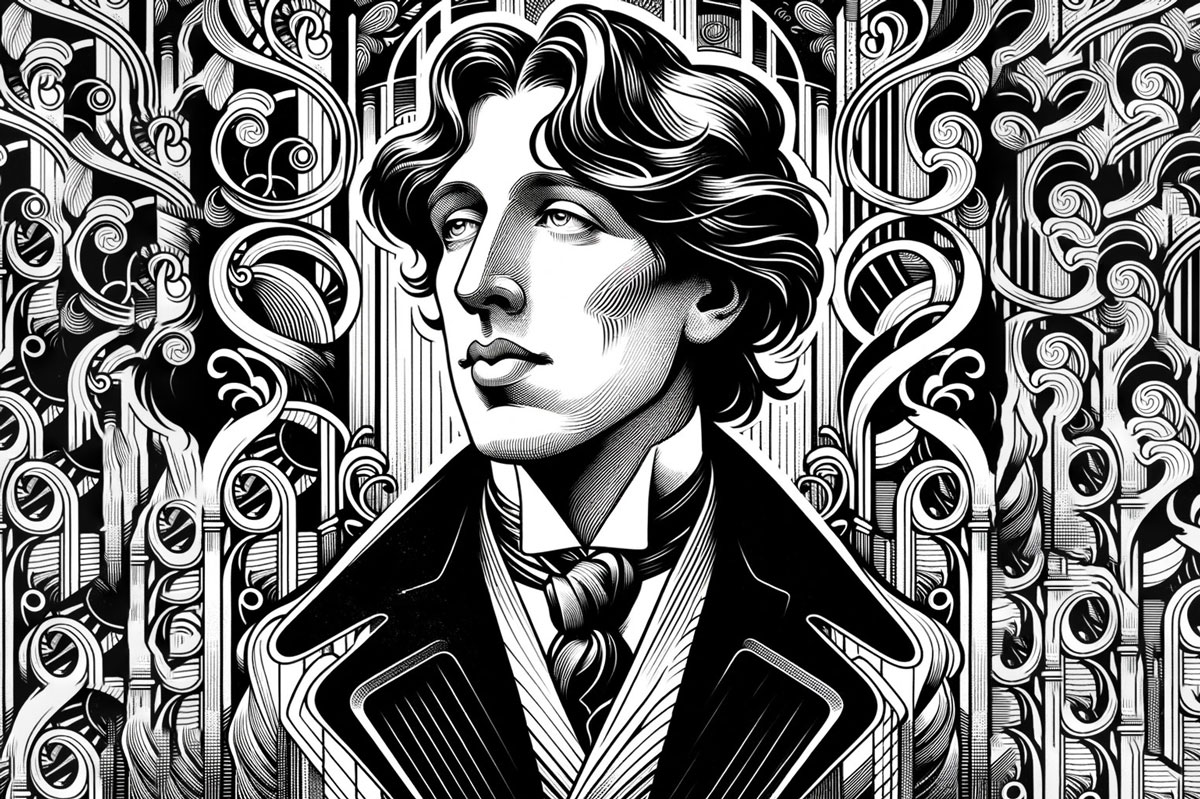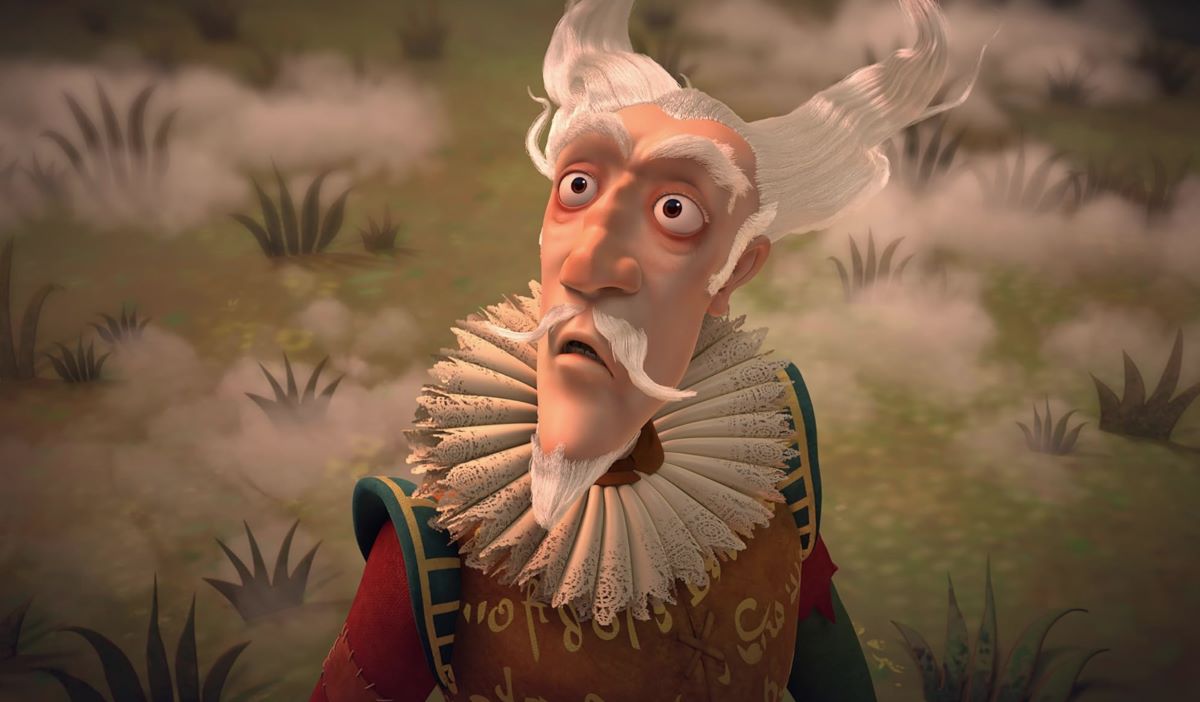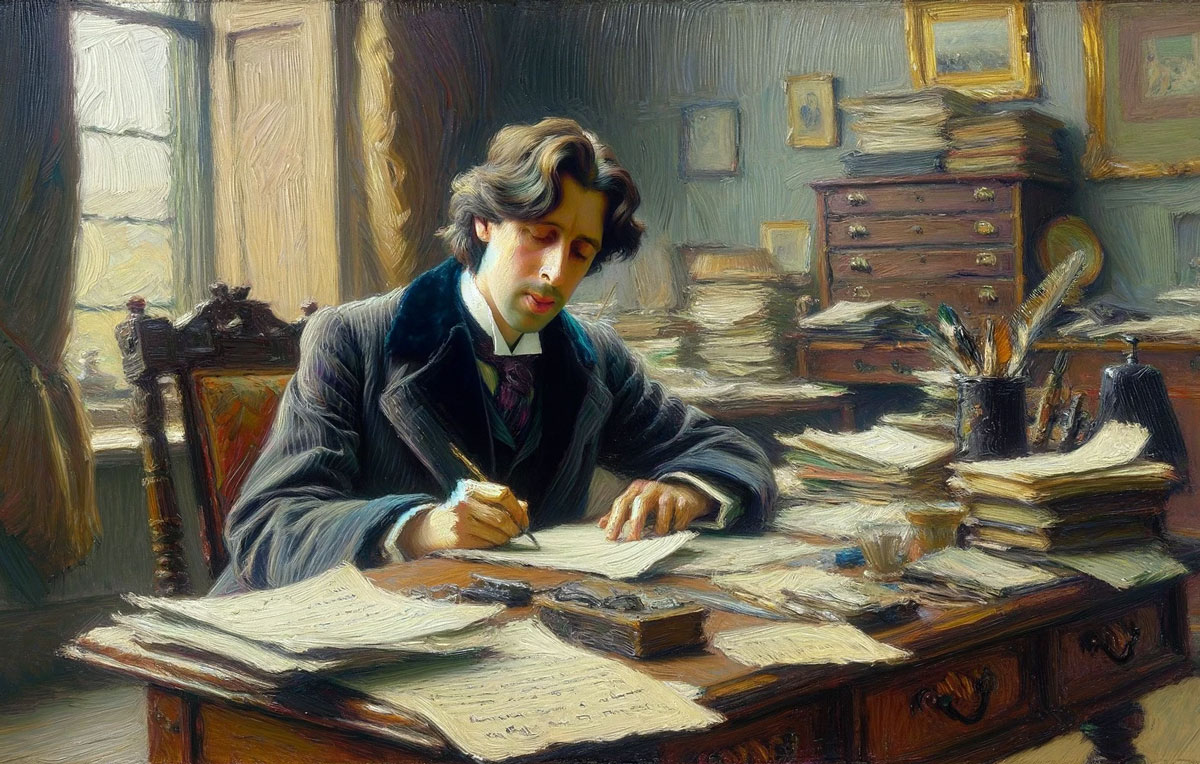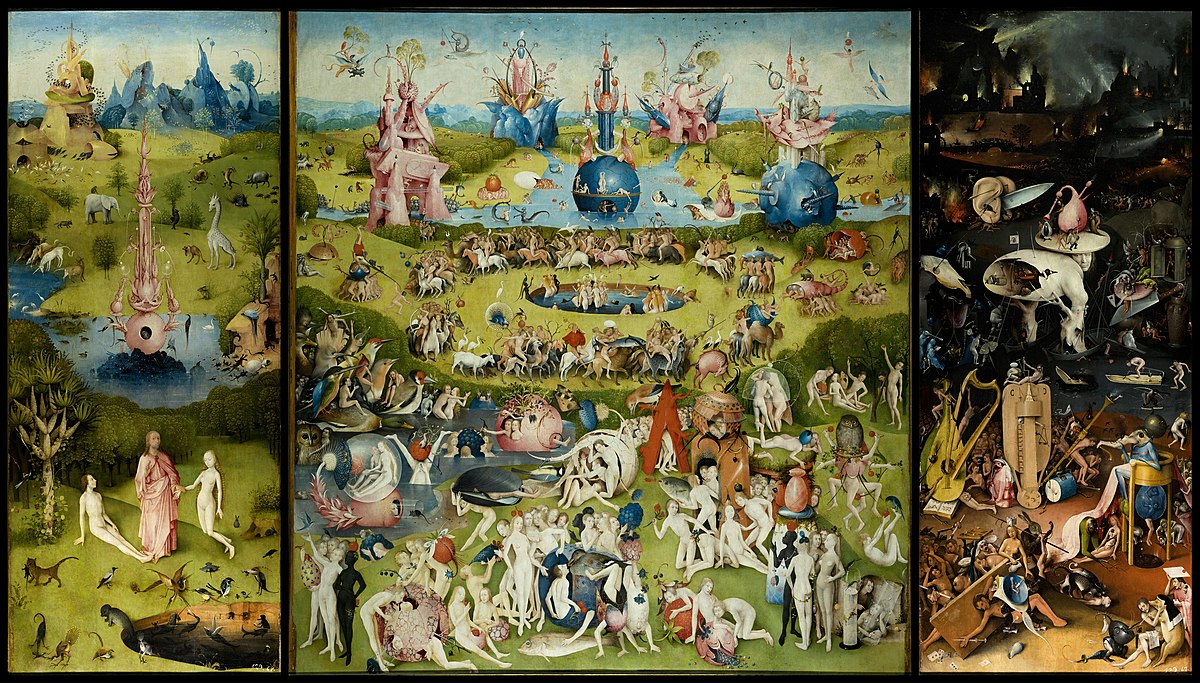Exploring the Depths of Wilde’s Most Personal Work
by Guido Bulla
De Profundis is the letter penned by Oscar Wilde, incarcerated for homosexuality in Reading Prison, during the early months of 1897. Addressed to Bosie, Lord Alfred Douglas, whom Wilde holds primarily responsible for his tragic fate, it wasn’t until the end of his detention on May 19, 1897, that Wilde’s faithful friend and future literary executor, Robbie Ross, managed to deliver the missive. Bosie, upon briefly perusing it, destroyed the letter, perhaps under the illusion that he possessed the original. However, Ross had wisely sent a copy, safeguarding the original to eventually entrust it to the British Museum in London in 1909, a good eight years after Wilde’s demise, with the strict condition that it not be made public for half a century. Only since 1962 have we had access to the complete text. As we can see, a series of complex and largely chance events have allowed us to read De Profundis in its presented form.
Knowing well that neither the author nor the intended recipient would have wished for our prying eyes, one risks feeling like a voyeur, uneasily peering into the folds of someone else’s fate, drawn in by a grim chapter of history. Masolino d’Amico, an astute and knowledgeable reader of Oscar Wilde, refuses to entertain such a notion, largely on the grounds that the text, produced by a man with a “congenital incapacity” to not produce literature, merits critical attention on its own.
De Profundis is worthy of attention for more general reasons too. It’s a rich and provocative read, presenting a medley of contradictions, as it mirrors the elusive and troubled personality of Oscar Wilde. It’s a testimony of his mercurial and evasive temperament, caught between the old aesthetic dreams of an ethereal art, disdainful of common mortal worries, and the new material reality imposed by the harshness of prison life.
1. The other half of the garden. Those familiar with Wilde’s more renowned works (like The Picture of Dorian Gray, The Importance of Being Earnest, or his famous tales such as The Happy Prince and The Young King) will immediately sense the shift in his writing. The first temptation is to note the contrast between Wilde the dazzling aesthete, the paradoxical master whom W.B. Yeats called the “the greatest talker of his time” and the sometimes broken, bent, impoverished person who signs off this hellish message.
The provocative inversion of art and life, with which the spirited dandy scandalized his contemporaries, can be invoked to underscore the multiple ironies life subjects us to or, worse, as an example of the sarcastic retribution in the career of a libertine. It’s as if a cruel fate granted the man, who usually considered “art as the supreme reality and life as a mere mode of fiction,” a near literal enactment of his famous The Picture of Dorian Gray. In this novel, the protagonist’s physical and moral degradation is temporarily “delegated” to his painted portrait. Similarly, in De Profundis, it’s evident that the masterpiece is soaked in blood. Lord Douglas, lending his body to the paper figure of Dorian, reveals a hidden “portrait” that, belying glittering exterior appearances, exposes nothing but selfishness, corruption, and death:
“I could have rent you with maledictions. I could have held up a mirror to you, and shown you such an image of yourself that you would not have recognised it as your own till you found it mimicking back your gestures of horror, and then you would have known whose shape it was, and hated it and yourself for ever.”
For the Oscar Wilde poseur and provocateur, life was theatre, and not the other way around: nature, in a subordinate role, was meant to reflect the more complete and unattainable universe of artistic creation, finding itself inadequate to the task. When the mask was everything, the presence of the face hardly mattered. Now, however, after the harsh test of imprisonment, the perspective shifts dramatically. There’s an autobiographical undertone in the sarcastic remark aimed at Bosie:
“A brazen face is a capital thing to show to the world, but now and then when you are alone, and have no audience, you have, I suppose, to take the mask off for breathing purposes. Else, indeed, you would be stifled.”
Now the mask cracks, showing its frailty; now, quite literally, the entire relationship between art and life needs renegotiation:
“I see new developments in art and life, each one of which is a fresh mode of perfection. I long to live so that I can explore what is no less than a new world to me. Do you want to know what this new world is? I think you can guess what it is. It is the world in which I have been living. Sorrow, then, and all that it teaches one, is my new world.”
Evil, sin, and mud (the oppressive recurrence of the latter imagery throughout De Profundis is hard to miss) are imprinted on the pages of our author, leaving indelible marks on his ingenious creations. In this vein, he levels yet another reprimand at his friend, drawing from the Shakespearean cosmos: “As an artist, my realm was Ariel. You thrust me into a brawl with Caliban.” From the lofty spheres of ethereal, musical art, one is pulled down into the tangible, raw corporeality of man and the world.
The world, indeed, “the other half of the garden,” as the writer calls those shadowy facets of existence he overlooked while descending “the primrose path to the sound of flutes” and living “on honeycomb,” asserts itself with forceful tangibility. His identity, no longer fleeting, is now firmly rooted to the earth. Suffering becomes the new pivot of his personality, so much so that Wilde seems to contemplate the theoretical formulation of an art founded on pain (“…sorrow is the ultimate type both in life and art”).
2. The ultimate paradox. But it’s not enough to hypothesize that the discovery and incorporation of the mediating power, the terrible balancing and maieutic function of pain, would have opened up new horizons for our author’s art. Wilde is more than this. One tends to forget (and Jacques Barzun does well to remind us) that despite the undeniably devastating dramatics of his prison experience, which would physically and morally break the writer, Wilde’s earlier work wasn’t just about witty conceptual inversions meant to astound the Victorian “Philistine.” The coexistence of a hilarious, irresponsible “18th-century” lightness and a more serious contemplation of social issues can be symbolically indicated by a simple coincidence of dates: in the same year, 1895, both The Importance of Being Earnest and The Soul of Man Under Socialism were published.
Wilde, therefore, can rightfully claim an aesthetic of engagement even in his seemingly lighter moments: wasn’t The Happy Prince also a hymn to solidarity and selflessness? And in The Young King, another small gem, didn’t he already oppose the attractions of the material world — a taste for an exhausted art, luxury, precious stones, the indispensable arsenal of every good decadent — with a Christian fraternity of pain? It’s not paradoxical to say that alongside a reading that sees in De Profundis the traumatic onset of a possible “second phase” of Wilde’s work, another might legitimately indicate, rather than fractures, a thread of underground coherence and unity that runs through Wilde’s production. The letter from prison doesn’t contain only retractions; it also features often violently contradictory moods: the most bitter repentance alternates with pride in past achievements; the blame towards Bosie, chastised for his enormous moral and cultural inferiority that Wilde tirelessly reproaches him for, finally melts into a poignant willingness for reconciliation, which, incidentally, later happens in real life. Finally, the discovery of a religious dimension, which might be a novelty for the author, is so filtered through literary awareness that we’re perhaps unjustly led to doubt its authenticity.
3. A religion “tailored for Wilde.” “All his life,” writes Vyvyan Holland, Wilde’s son, “my father had an intense leaning towards religious mysticism and was strongly attracted to the Catholic Church, into which he was received on his death bed in 1900.” Certainly, De Profundis abounds, especially in the latter part, with heartfelt professions of faith, but the problem of Wilde’s religiosity seems destined to remain unresolved. The text carries frail and discordant traces of the writer’s supposed mysticism, often close to the pagan spirit (“Religion does not help me. The faith that others give to what is unseen, I give to what one can touch, and look at. My gods dwell in temples made with hands; and within the circle of actual experience is my creed made perfect and complete.”), or concocts a religion of its own measure, in which the aesthetic and metaphysical elements are clearly struggling for dominance.
Even in his praise of Christ, Wilde’s characteristic “tone” is felt. The human story of the “young Galilean peasant imagining that he could bear on his own shoulders the burden of the entire world” is contemplated as a sublime artistic masterpiece, scrutinized with the tools a refined critic would apply to the reading of a literary text or a perfect theatrical script. The Gospels themselves become “the four prose poems about Christ.” Wilde’s Redeemer, opposing the “dreary classical Renaissance,” becomes a Romantic. But even here, the writer astonishes and fascinates, for he manages to infuse intense emotional warmth into an operation that might seem designated (according to dynamics not unknown to the Victorian universe) to reduce religion to a pure aesthetic and cultural phenomenon (the value of the Mass would consist both in its being an unbloody sacrifice and in its theatricality, since the interaction between the officiant and the community would represent the last survival of the Chorus of classical tragedy).
And so, contrasts pile upon contrasts: if Wilde’s religious discourse convinces with its firm identification of Christ with love and forgiveness, the cards are soon reshuffled, as egocentrism is always lurking. The consideration that for Christ “there were no laws: there were exceptions merely” sounds a bit suspect if we remember that the writer applied the phrase to himself in almost identical terms (“Morality does not help me. I am a born antinomian. I am one of those who are made for exceptions, not for laws”); especially since we then discover that he uses the same criterion to identify one of the most typical elements of modern art (“We are no longer in art concerned with the type. It is with the exception that we have to do”). In short: it would be art that constitutes the middle ground, uniting Wilde and Christ in a neutral zone. But there’s more: the poet desolately exposed to public ridicule at Clapham Junction clearly sees himself as a replica of Jesus, whose figure of a suffering romantic artist in turn shines through Wilde himself.
Art and sanctity, therefore, are almost synonyms in the end. Paradoxically, far from signaling reconsiderations, these considerations seem to resume and indeed corroborate the positions of the early Oscar Wilde.
De Profundis is not exhausted here, a text that operates on multiple levels. Those who approach it animated by specifically literary interests will find themselves facing a great critic and many far-sighted insights. Such are Wilde’s reflections on the inevitable isolation that forces the modern artist, uprooted from accepted traditions, to reinvent his coordinates in each work; or his important considerations on the death of tragedy in the contemporary world and on the encroachment, in its place, of a grotesque dimension. The scholar of today’s theatrical scene will not miss that De Profundis already outlined with a sure hand the matrix of a well-known contemporary work like Rosencrantz and Guildenstern are Dead (1967) by Tom Stoppard.
Even the reader who does not examine De Profundis as an object of study will find several surprises. Many moralistic or prurient expectations will be disappointed by the discovery that a document born from a painful story of homosexuality touches its emotional peaks when the writer, after so many and too often monetized recriminations, manifests towards his friend a feeling of forgiveness for love that sounds delicately paternal: it is symptomatic, from this point of view, that the third protagonist (and he certainly deserves the title of co-star, even only in virtue of the frequency with which he is evoked) is a “wrong” parental figure, that of Lord Douglas senior, Bosie’s biological father. Moreover, the text does not lack intellectual provocations of every kind, like that peculiar Jesus transformed into a champion and icon of a timeless romanticism. One might be disturbed by the strength of the feelings and the conflicting attitudes assumed by Wilde who, alternately, covers his head with ashes and defends his past choices or takes on almost demonic valences to then propose himself immediately after as a counterfigure of a Christ/Artist persecuted by the eternal Philistines of every epoch and nation. In a letter that should be the quintessence of intimacy, an astonishing repertoire of biblical and literary quotes is exhibited, and here and there, notable rhetorical finesse.
But, as mentioned, what emerges most from De Profundis, in its extraordinary complexity, is that authentic Janus-faced figure that is the man Oscar Wilde, capable of being affected in his pain and deeply unsettling in his fables, adept at making artificiality and truth, mask and face, moral seriousness and theatrical coquetry coexist, in alternating between harsh penitential moods and proud, virile claims of his own greatness as an artist.
Oscar Wilde, Tutte le opere, Newton Compton, 1994




